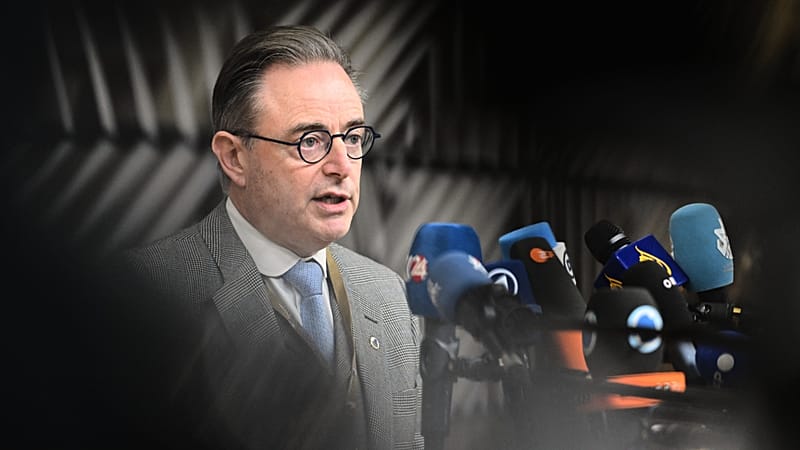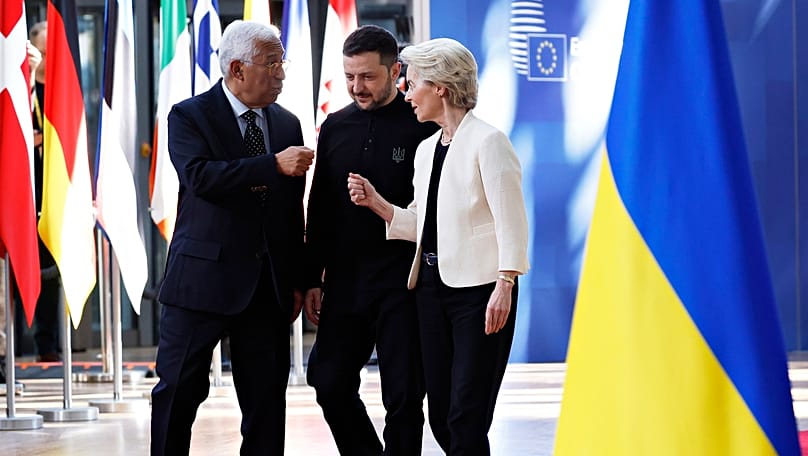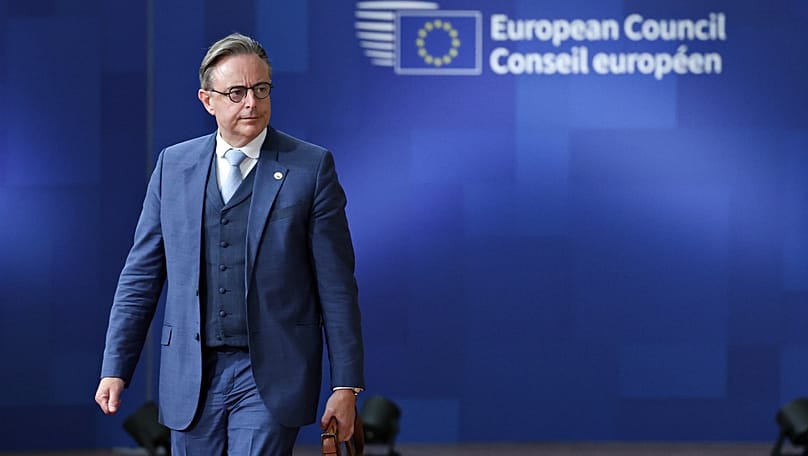'Fundamentally wrong': Belgian prime minister doubles down on opposition to reparations loan

Belgian Prime Minister Bart De Wever has doubled down on his opposition to the European Union's proposal to use the immobilised Russian assets and issue a so-called reparations loan to Ukraine, calling the idea "fundamentally wrong".
"Why would we thus venture into uncharted legal and financial waters with all possible consequences, if this can be avoided?" De Wever wrote in a letter to Ursula von der Leyen, the president of the European Commission, and seen by Euronews.
"I will never commit Belgium to sustain on its own the risks and exposures that would arise from the option of reparations loan."
Instead of using the Russian assets, he adds, the EU should jointly borrow €45 billion on the markets to cover Kyiv's financial and military needs for next year.
"Such an option would, as a matter of fact, come cheaper than other options, in particular the option of a reparations loan, if all risks are factored in," he says.
De Wever also argues that the reparations loan, which has no precedent, risks derailing the White House's efforts to achieve a peace deal between Ukraine and Russia, a view that clashes with other leaders who see the assets as the bloc's greatest leverage.
He believes it is "very probable" that Russia would not be declared the "losing party" and therefore be entitled to recover its sovereign property currently subject to EU sanctions.
"Hastily moving forward on the proposed reparations loan scheme would have, as collateral damage, that we, as the EU, are effectively preventing reaching an eventual peace deal," De Wever tells von der Leyen.
"As we can expect Ukraine not being able nor willing to return the loans it has been granted on the basis of these Russian sovereign assets, it seems certain that the European taxpayer will be addressed again."
The bulk of the Russian Central Bank's assets, around €185 billion, is held at Euroclear, a central securities depository based in Brussels. There are about €25 billion spread across private banks in other member states, yet to be disclosed.
As the home to Euroclear, Belgium fears it would be first in line of Moscow's legal retaliation and held liable not only for the entire loan but also for potential damages arising from legal challenges, a theme that De Weves underlines in his four-page letter.
De Wever first held up the proposal in a high-stakes summit in mid-October, demanding the "full mutualisation" of the risks, airtight guarantees from other member states and maximum transparency to locate the remainder of the Russian assets.
Since then, the European Commission has engaged in talks with Belgium to find a solution to the many legal, financial and diplomatic questions about the loan.
Earlier this month, von der Leyen sent a letter to EU leaders outlining three main options to support Ukraine's budgetary and military needs: bilateral contributions from each state, common borrowing at the EU level, or a reparations loan based on Russian assets.
On Friday, the Commission confirmed receipt of De Wever's letter but declined to comment on its substance.
"These are uncharted waters, so it’s legitimate to ask questions, to share concerns," said Paula Pinho, the Commission's chief spokesperson. "We are really doing our utmost to address those concerns in a satisfactory manner so that everybody can feel confident and comfortable with any solution that is put forward eventually."
Race against time
Belgium's views set it on a collision course with the majority around the table.
Most countries, including Germany, Poland, the Nordics and the Baltics, have rallied behind the reparations loan because it would spare their treasuries from footing the bill, at least initially, and fulfil the philosophy of "make Russia pay".
Von der Leyen has been a vocal advocate of this push. On Wednesday, she vowed to move forward with the plan and present the required legal texts to make it happen.
"To be very clear – I cannot see any scenario in which the European taxpayers alone will pay the bill. This is also not acceptable," she told MEPs in Strasbourg.
"Another thing must also be clear – any decision on this needs to be taken in line with the rules of the responsible jurisdictions and will respect European and international law."
On Thursday, German Chancellor Friedrich Merz said a decision on the reparations loan could help strengthen the EU's voice in the US-led peace talks.
"We want to make even greater use of these assets to support Ukraine," Merz said.
The original 28-point peace plan, secretly drafted without European input, featured a highly controversial model that would use the Russian assets for Washington's and Moscow's commercial benefit. The provision is believed to have been removed after discussions between the US and Ukraine in Geneva.
The EU has insisted that any provision related to the Russian assets under EU jurisdiction would require the bloc's "full involvement".
Meanwhile, Russian President Vladimir Putin said that touching the funds would amount to "theft" and prompt "countermeasures" from his government.
The 27 EU leaders will gather in Brussels on 18-19 December to make a decision, which is necessary to approve Ukraine's new programme with the International Monetary Fund.
In his letter to von der Leyen, De Wever did not entirely close the door on the reparations loans, despite his many grievances.
But he raised the bar high to grant his blessing.
In the letter, the premier demands "legally binding, unconditional, irrevocable, on-demand, joint and several guarantees" to cover the €185 billion in Russian assets and all the potential fallout, such as arbitration costs, interests, investment opportunity loss and even the "quantification of financial impact to the Central Bank of Russia's credit".
He also asks for total coverage for Euroclear's holdings in "Russia-friendly jurisdictions", which he said could be subject to retaliatory measures.
It's unclear how much this would mean in practice, as some of the scenarios, such as a Belgian defeat at court, are entirely hypothetical.
"Some may hold the belief that this is only a theoretical exposure. l am making the point that this danger is, to the contrary, real and likely to happen," De Wever writes.
"The consequences of a successful legal challenge could be most serious," he goes on.
"Let me use the analogy of a plane crash: aircraft are the safest way of transportation and the chances of a crash are low, but in the event of a crash, the consequences are disastrous."
Additionally, De Wever warns the loan could be perceived as "illegal confiscation" by foreign nations and investors, even if the proposal would allow Moscow to recover the assets if it agreed to compensate for the havoc wreaked by its war of aggression.
Von der Leyen herself has admitted the possibility of reputational damage.
"These risks are unfortunately not academic but real," De Wever writes.
"If the scheme is adopted, we should expect knock-on effects on sovereign assets held by other non-EU states within the EU, as such nations may fundamentally question their willingness to hold assets in Europe."
This article has been updated with more information.
Today



